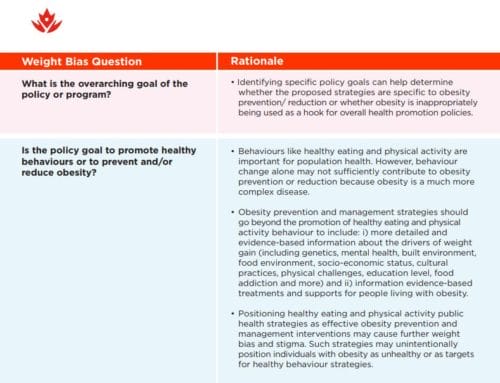Today’s blog post comes from Marcus Moore. Marcus is the Resource Coordinator of the Students and New Professionals National Executive and a law student at Western University. You can read his full bio on our SNP National Executive page.
In the summer of 2020, I had the pleasure to work as a research assistant for Professor Jacob Shelley in the Western University Faculty of Law. The focus of my research was on weight discrimination in Canada.
People experience weight discrimination in many situations. However, most cases involving weight discrimination that have come before the tribunals and courts have occurred in an employment setting. In this article, I will outline the current legal protections for employees discriminated against due to their weight and will offer an opinion on what changes should be made to reduce weight discrimination in the workplace.
Physical size barring employment
The owner of a shoe store tells an employee that they will be fired if they do not lose 35 pounds in six weeks.
A retirement home seeking a nurse’s aide rejects a qualified applicant solely because of their weight and appearance.
According to human rights legislation across Canada, such actions by employers are acceptable. This is despite the fact that the objective of human rights legislation is to ensure dignity and respect for all Canadians by protecting them from discrimination.[1]
In fact, the two scenarios listed above outline actual events that occurred in Canada. Carolyn Maddox had been a sales clerk at Vogue Shoes in St. Catherine’s, Ontario for 17 years when the owner of the store told her that she must lose weight or have her employment terminated.[2]
Sandra Lynn Davison was a nurse’s aide who applied for an open position at a retirement home in Melville, Saskatchewan. Despite her being completely qualified and claiming to be in excellent health,[3] she was rejected from the position for the sole reason that she was overweight.
Mrs. Maddox and Ms. Davison were forced to endure unfair treatment from an employer due to their personal attributes, yet they were unable to seek a legal remedy under their respective provincial human rights statutes. This is because among the many protected grounds against discrimination (e.g. age, race, sexual orientation, etc.), weight and body size are not included in any province. This is a problem that must be addressed by provincial legislatures. Situations like those mentioned above will continue to occur if changes are not made. Weight or body size must be added as a protected ground against discrimination in human rights legislation across Canada.
Where does the law currently stand on weight discrimination?
Because weight and body size are not included as protected grounds, employees have limited options when they are discriminated against because of their weight. Prior case law indicates that discrimination due to obesity, in some instances, will be prohibited under the ground of disability.[4]
In order for an employee to be successful in proving discrimination due to disability in this context, they must prove that their obesity constitutes a disability or that their employer perceives their obesity to be a disability.[5]
It is definitely encouraging that some forms of weight discrimination are prohibited under this ground. But forcing employees to file complaints under the protected ground of disability comes woefully short of providing sufficient protection.[6]
Why protection through disability is insufficient
An employee with obesity who has been subjected to weight discrimination will often find it difficult to attain a legal remedy under human rights legislation. This is because they must go beyond simply showing that their weight was the reason for the unfair treatment they experienced.[7] This results in weight discrimination only being prohibited in very limited circumstances. Namely, when there is an actual or perceived disability involved.
Being forced to submit a complaint based on an actual or perceived disability does not protect against weight discrimination that is rooted in simple distaste of appearance.[8] Take the case involving Mrs. Maddox as an example. She was discriminated against by her employer simply because they did not like the way she looked. Due to the fact that her abilities were not limited by her weight (and she was not perceived to be limited), Mrs. Maddox’s complaint was unsuccessful.[9]
Also, the protection from weight discrimination under disability only applies to employees who have (or are perceived to have) obesity. If an employee with obesity has a difficult time substantiating a discrimination complaint under this protected ground, what about one who is subjected to weight discrimination and does not have obesity? There is the often cited example of the Russian Bolshoi ballerina who weighed under 110lbs and was let go for being overweight.[10] Or a case from New Jersey, where 22 cocktail waitresses at the Borgata Hotel, Casino & Spa sued their employer for weight discrimination. The waitresses were subjected to frequent weigh-ins and were suspended if they came in at 7% heavier than their weight at hire.[11] In these cases, the victims of discrimination were clearly not persons with obesity and were not actually or perceived to be disabled. Nevertheless, they were discriminated against because of their weight. So if these situations occurred in Canada, under what protected ground could these employees file a discrimination complaint and have a reasonable chance of success? The case law indicates that they would not have a reasonable chance of success under any ground. They would have no protection.
Any complainant is at a huge disadvantage having to prove that the weight discrimination they were subjected to was rooted in an actual or perceived disability. In this way, victims of weight discrimination are being let down by human rights legislation in Canada.
Adding “weight” or “body size” as protected grounds against discrimination
Adding “weight” or “body size” as protected grounds in all human rights legislation will help ensure that all instances of weight discrimination are prohibited. This is the best way to limit this unnecessary discrimination and provide greater protection across Canada.
Provinces can look to the Elliott-Larsen Civil Rights Act in Michigan for inspiration when making this addition to existing statutes. Since 1976, Michigan has included height and weight as protected grounds against discrimination in employment. This has allowed for comprehensive protection and simplified discrimination laws, ultimately contributing to more inclusive workplaces. Rather than having to prove a real or perceived disability, discrimination is established simply by proving that an individuals’ weight was a reason for discharge or mistreatment.[12]
There appears to be public support for such additions to legislation in Canada. A 2015 study found that the Canadian public strongly supports the idea of implementing legal measures to address weight discrimination, particularly in the employment setting.[13] More specifically, this study found support for adding body weight as a protected ground in existing human rights statutes.[14] Laws that would consider obesity as a disability received the least support.[15] Unfortunately, despite these findings, little effort has been made by politicians to introduce weight or body size as protected grounds.[16]
Ultimately, employees should be judged on the basis of their performance, not on the basis of irrelevant personal attributes. Adding weight or body size as protected grounds will create a more inclusive workplace and will assist in upholding dignity and respect for all workers.
[1] It is common for human rights statutes in Canada to explicitly include objectives like these. As an example, see under “Preamble” in the Ontario Human Rights Code or under “Purposes” in the British Columbia Human Rights Code.
[2] Ontario (Human Rights Commission) v Vogue Shoes (1991), 14 CHRR D/425 (Ont Bd Inq) [Vogue Shoes]. To access internet archive of this case: https://archive.org/details/boi91_004/mode/2up
[3] Saskatchewan (Human Rights Commission) v St. Paul Lutheran Home of Melville, Saskatchewan (1993), 108 DLR (4th) 671 (Sask CA) at para 4 [St. Paul Lutheran].
[4] Quebec (Commission des droits de la personne et des droits de la jeunesse) v Montréal (City); Quebec (Commission des droits de la personne et des droits de la jeunesse) v Boisbriand (City), 2000 SCC 27 at para 48.
[5] Johnson v D & B Traffic Control, 2010 BCHRT 287.
[6] This argument comes from Emily Luther’s amazing article on weight discrimination: Emily Luther, “Justice for all Shapes and Sizes: Combatting Weight Discrimination in Canada” (2010) 48:1 Alberta Law Review 167.
[7] Must be rooted in a real or perceived disability, as expressed in Vogue Shoes, supra note 2 and St. Paul Lutheran, supra note 3.
[8] Luther, supra note 6 at 181.
[9] Vogue Shoes, supra note 2 at para 70.
[10] CBC News, “Too big to lift, Russian ballerina fired” (September 17 2003): https://www.cbc.ca/news/world/too-big-to-lift-russian-ballerina-fired-1.368076
[11] Josh Sanburn, “Too Big to Cocktail? Judge Upholds Weight Discrimination in the Workplace” Time (July 26 2013): https://nation.time.com/2013/07/26/too-big-to-cocktail-judge-upholds-weight-discrimination-in-the-workplace/
[12] See the following two cases from Michigan: Ross v Beaumont Hospital (https://law.justia.com/cases/federal/district-courts/FSupp/687/1115/1768048/) and Lamoria v Health Care & Retirement Corp (https://www.courtlistener.com/opinion/1235627/lamoria-v-health-care-retirement-corp/).
[13] Rebecca M Puhl et al, “Potential Policies and Laws to Prohibit Weight Discrimination: Public Views from 4 Countries” (2015) 93:4 The Milbank Quarterly 691 at 714 and 723.
[14] Ibid at 718.
[15] Ibid at 720.
[16] The Hon. Jon Gerrard, Liberal MLA in Manitoba, has made three unsuccessful attempts to get weight and physical size added as protected grounds against discrimination in the Manitoba Human Rights Code. Read more here: https://www.cbc.ca/news/canada/manitoba/manitoba-obesity-rights-bill-rejected-1.4384627




